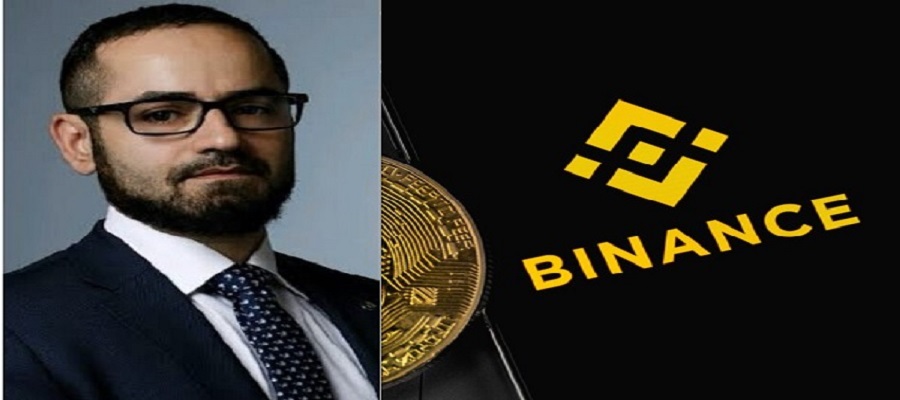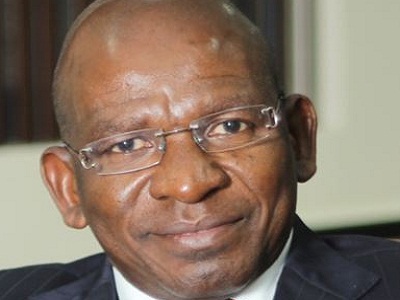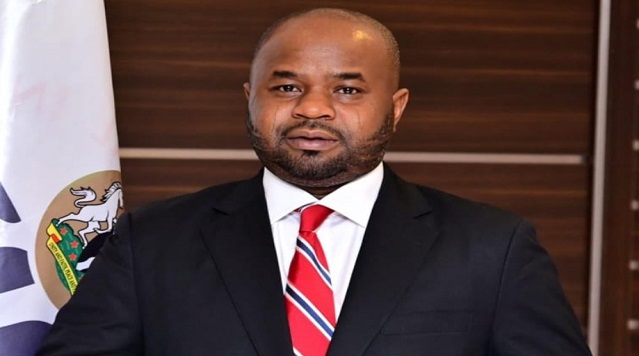News
Binance Chief Insists Some FG Officials, Reps Demand $150m Bribe

Tigran Gambaryan, top official of Binance, at the weekend, maintained his stance on the bribery allegations against some Nigerian government officials and House of Representatives members.

Tigran Gambaryan
Gambaryan insisted Nigerian officials demanded bribes from him despite the denial of the Federal Government.
Recall that Gambaryan, who is Binance’s head of financial crime compliance, was detained in Nigeria from February to October 2024.
Nigerian government said his arrest was part of a broader investigation into alleged money laundering and economic destabilisation attributed to Binance’s activities in Nigeria.
On Friday, while recounting his initial experience on the issue on Twitter, Gambaryan accused some Nigerian lawmakers of demanding substantial bribes in cryptocurrency.
He specifically accused three lawmakers of soliciting a $150 million bribe from him, naming Philip Agbese, Ginger Onwusibe and Peter Akpanke as the three federal legislators who demanded the huge bribe from him to allegedly forestall his arrest and prosecution.
He further alleged that Nuhu Ribadu, National Security Adviser, sought significant payouts from Binance for his political ambition.
But in a swift response, Mohammed Idris, minister of Information and National Orientation, dismissed Gambaryan’s allegations as “outrageous” and “defamatory”.
Idris explained that the Nigerian government had rejected a $5 million offer from Binance intended to secure Gambaryan’s release, opting instead for a more favourable settlement with the US government.
He said Gambaryan’s claims lacked credibility and appeared to be an attempt to discredit Nigerian officials.
But Gambaryan in his latest post on the development on Saturday on his X, said the Federal Government used him as leverage to negotiate a beneficial settlement with the US government.
He wrote, “I was invited by the Nigerian FIU to a meeting in January. Last time I checked, they are part of the Nigerian government. House members also invited us to the meeting. Last time I checked, the legislative branch is also part of the Nigerian government.
“You said the second part was part of a probe? Lol. So when you invited us to a friendly meeting, you even lied about that. I was in a safe house for a month, watching TV, while you were trying to use me as leverage. You then panicked and knowingly charged me with blatantly false accusations.
“So I was released on humanitarian grounds? At least you’re finally admitting the need to release me. Last time you posted, you claimed my health was fine and that there was nothing wrong with me”.
The crypto expert further stated, “You investigated? Yet you didn’t take a statement from me? A person with direct knowledge. What a joke.
“You dragged my name through the mud for the past year with zero evidence against me, nearly killed me, and caused trauma to my family. And now you have the nerve to talk about defamation?
“I’ll put my credibility on the line anytime. In court? You mean like last time, when your attorneys didn’t even show up to the human rights suit in Abuja?
“Get your facts straight. I am done with this foolishness. I said my part. I’ll be off Twitter now since it’s pointless to argue with evil.”
While insisting that his claim was factual despite the denials, Gambaryan added, “What I shared was factual, based on my personal experiences and conversations with those who have direct knowledge of the events I discussed; information that was shared with both Nigerian and US law enforcement.
“So please, allow me to leave this behind and find peace”.
The Binance executive said it was the responsibility of law enforcement agents in both Nigeria and the US to see the investigation into the matter through.
He said he is no longer in law enforcement, adding that the responsibility of seeing this through to a logical conclusion now falls on those still serving in the United States and Nigeria.
He added, “Many requested that I stay on and provide further commentary on the issues I posted about yesterday (Friday). Here’s the hard truth: what I shared was meant to fill in the gaps left by Wired and NPR’s reporting.
“The reality is that last year was incredibly painful for me and my family. I dedicated my life to fighting crime as a Special Agent with the United States Department of the Treasury and as a compliance professional. It was an honour to serve my country and it was a blessing that they came to my rescue and mobilised the full force of the US Government when I was in need.
“Being dragged through court on “outrageous, baseless, and trumped-up charges”, he posited, “didn’t just hurt me but also brought immense pain to my family.
“I don’t want to see my kids cry because I’m not around. I don’t want to see videos of my 75-year-old mother on television in tears. I don’t want to see my wife crying on TV. I want to put this nightmare behind me and move on.”
News
Trump Says He Made no Mistake Sharing Video Depicting Obamas as Apes

United States President Donald Trump has said he made no mistake for a video briefly shared on his official Truth Social account that depicted former President Barack Obama and former First Lady Michelle Obama as apes.

Former President Barack Obama
Speaking late Friday to reporters accompanying him aboard Air Force One, Trump insisted he made no mistake by sharing the video and does not need to apologise.
“I didn’t make a mistake,” he said.
Trump explained that he did not watch the entire clip before it was posted.
“I didn’t see the whole thing. I looked at the first part, and it was really about voter fraud in the machines, how crooked it is, how disgusting it is.
“Then I gave it to the people. Generally, they look at the whole thing. But I guess somebody didn’t,” he said.
When asked directly whether he condemned the video’s content, Trump replied, “Of course I do.”
The video, which was posted late Thursday, pushed a conspiracy theory about voting machines used during the 2020 election and included a racist depiction of the Obamas.
It remained on Trump’s Truth Social account for about 12 hours before being deleted on Friday morning, following widespread bipartisan calls for its removal.
The White House initially defended the post in an emailed statement to reporters on Friday morning by Karoline Leavitt, Press Secretary,.
She said, “This is from an internet meme video depicting President Trump as the King of the Jungle and Democrats as characters from The Lion King.”
Leavitt added, “Please stop the fake outrage and report on something today that actually matters to the American public.”
Hours after the statement was issued, the video was removed from Trump’s official Truth Social account.
News
Orya, Ex-NEXIM MD Jailed 490 Years for N2.4Bn Fraud

Robert Orya, former managing director, Nigerian Export-Import Bank, (NEXIM), has been sentenced to a cumulative 490 years’ imprisonment over a N2.4 billion fraud, following his conviction by a Federal Capital Territory (FCT) High Court in Abuja.

The conviction was secured by the Economic and Financial Crimes Commission (EFCC). Justice F. E. Messiri sentenced Orya to 10 years’ imprisonment on each of the 49 counts brought against him, with the sentences running cumulatively.
Orya, who headed NEXIM Bank between 2011 and 2016, was prosecuted by Samuel Ugwuegbulam, EFCC counsel.
The anti-graft agency accused him of fraudulently diverting funds belonging to the bank—charges the court held were proven beyond reasonable doubt.
Delivering judgment, Justice Messiri ruled that the prosecution successfully established its case, finding the former bank chief guilty on all 49 counts of fraud.
The conviction has been widely linked to the renewed momentum within the EFCC under Mr. Ola Olukoyede, its Chairman, whose leadership has seen a reinvigoration of the agency’s resolve to pursue high-profile corruption cases to their logical conclusion.
Since assuming office, Olukoyede has repeatedly vowed that no individual, regardless of status or past influence, would be shielded from accountability.
Under his stewardship, the EFCC has intensified the prosecution of complex financial crimes, particularly cases involving public institutions and large-scale diversion of funds.
Observers say the sentencing of a former chief executive of a government-owned bank underscores the EFCC’s determination to restore public confidence in the anti-corruption fight and sends a strong signal that financial misconduct will attract severe consequences.
The judgment is regarded as one of the most significant convictions secured against a former banking chief in recent years, reinforcing the agency’s resolve to clamp down on economic crimes within Nigeria’s financial sector.
During his tenure at NEXIM Bank, Orya was initially credited with efforts to reposition the institution to support non-oil exports and improve its financial standing after earlier setbacks.
However, his administration later became enmeshed in controversies, including allegations of loan disbursement irregularities and procedural abuses.
The case, which culminated in Thursday’s judgment, centred on findings that Orya diverted public funds estimated at N2.4 billion—offences that ultimately led to his conviction and lengthy prison sentence.
News
NRS Chairman Outlines Ways Nigeria can Move from Potential to Economic Prosperity

Zacch Adedeji, chairman of the Nigeria Revenue Service (NRS) has called for a paradigm shift in dependence on raw material exports to one that embrace ideas, innovation and the production of complex products as a pathway to sustainable economic growth and national prosperity.

Adedeji made the submission while delivering the maiden distinguished personality lecture of the Faculty of Administration, Obafemi Awolowo University (OAU), Ile-Ife, Osun State, on Thursday.
A statement by his Special Adviser on Media, Dare Adekanmbi, said Adedeji, in the lecture entitled, ‘From Potential to Prosperity: Export-led Economy’, stressed the need to rethink growth through the lens of complexity by not just producing more of the same stuff.
He lamented that Nigeria possesses a high-tech oil sector and low-productivity informal sector as well as lacking “the vibrant, labour-absorbing industrial base that serves as a bridge to higher complexity.”
The NRS boss stated that Nigeria witnessed stagnation in its exportation drive for three decades between 1998 to 2023, and only added six new products in its export basket list between 2008 and 2023.
“Because of our current position, the Harvard Atlas concluded that we are positioned to take advantage of very few opportunities to diversify using what we already know.”
Adedeji urged Nigeria to learn from the world by comparative study of success and failure like Vietnam, Bangladesh, Indonesia, South Africa and Brazil.
“We are not just looking at numbers in a vacuum; we are looking at the strategic choices made by nations like Vietnam, Indonesia, Bangladesh, Brazil, and South Africa over the same twenty-five-year period. While there are many ways to under perform, the path to success is remarkably consistent: it is defined by a clear strategy to build economic complexity.
“When we put these stories together, the divergence is clear. Vietnam used global trade to build a resilient, complex economy, while the others remained dependent on natural resources or a single low-tech niche.
“There are three big lessons here for us in Nigeria as we think about our roadmap. First, avoiding the resource curse is necessary, but it is not enough. You need a proactive strategy to build productive capabilities.
“Vietnam’s success came from integrating itself into Global Value Chains (GVCs). They positioned themselves as the assembly hub for the world’s electronics, importing high-tech parts and exporting finished products.
“This allowed them to “borrow” technology and management skills from abroad to build their own know-how.
“Nigeria, on the other hand, remains a supplier of raw materials to these chains, not an active participant within them. We must realise that productive capabilities are not permanent. The examples of South Africa and Brazil show us that you can actually lose your industrial edge if you are not careful. Over-reliance on the easy path of resource extraction creates economic and political incentives that crowd out the difficult, long-term work of building an industrial base.”
He added that for Nigeria, which is at an even earlier stage of development and even less diversified than these nations, the warning is stark.
“Relying solely on our natural endowments isn’t just a path to stagnation; it’s a path to regression. The global economy increasingly rewards knowledge and complexity, not just what you can dig out of the ground. If we want to move from potential to prosperity, we must stop being just a source of raw materials and start being a source of ideas, innovation, and complex products.
He added that President Bola Tinubu has already begun the difficult work of rebuilding the economy to ensure collective knowledge to innovate, produce and build a resilient economy.
“The journey from potential to prosperity is not a short one, but with the right map and the right resolve, it is a journey we can finally complete,’ he added.

 E-Financial3 days ago
E-Financial3 days agoMajority of Nigerians do not Trust Govt with Tax Revenue – SBM

 News3 days ago
News3 days agoLeadway Assurance Commences Use of Fintech in Insurance Product Distribution

 E-Business3 days ago
E-Business3 days agoNDPC Commits to Balancing Data Privacy, Protection Information

 Telecom3 days ago
Telecom3 days agoMoMo PSB, SMEDAN Forge Pact to Digitise Nigeria’s SMEs

 E-Financial3 days ago
E-Financial3 days agoWhy FirstBank Wrote off N748Bn Bad Loan – Otedola

 Telecom3 days ago
Telecom3 days agoMTN Ignites Teacher Revolution: 5,000 Digitally Armed for Phase Two

 E-Financial3 days ago
E-Financial3 days agoUnity Bank Unwraps Mobile App to Deepen Digital Banking Experience

 General News3 days ago
General News3 days agoFG Partners World Bank, AfDB on Climate Action



























